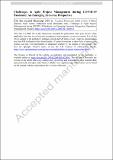| dc.contributor.author | Sharma, Manu | |
| dc.contributor.author | Luthra, Sunil | |
| dc.contributor.author | Joshi, Sudhanshu | |
| dc.contributor.author | Joshi, Himanshu | |
| dc.date.accessioned | 2022-09-13T13:47:34Z | |
| dc.date.available | 2022-09-13T13:47:34Z | |
| dc.date.issued | 2022-04-26 | |
| dc.identifier.uri | https://hdl.handle.net/1721.1/145360 | |
| dc.description.abstract | Abstract
Globally, COVID-19 pandemic has affected more than 214 countries across the world, creating uncertainty and affecting every institution and individual. The organisations recognise the need of agile projects that may offer several benefits including faster deployments, adaptability and best fit alignment to fulfill the customer needs. Implementing agile projects is the key to survive in the post pandemic situation, but emerging economies have limited scope for implementation. The present study determines the critical factors that restricts implementation of agile projects in emerging economies. The critical factors are identified from literature and validated by experts. The validated critical factors are further assessed to identify the cause-and-effect relationship using Fuzzy Decision-Making Trial and Laboratory (F-DEMATEL) method. The results of the study posit ‘Skepticism towards the new way of working’ is the most significant causal factor affecting other factors. This study is an attempt to help project managers to consider the significant factors for agile project implementation in post pandemic situation. The project managers may be benefitted from this study by considering these factors to manage challenges for agile project implementation in emerging economies. This study contributes to assess the influencing and the influenced challenging factors for agile project implementation. | en_US |
| dc.publisher | Springer US | en_US |
| dc.relation.isversionof | https://doi.org/10.1007/s12063-021-00249-1 | en_US |
| dc.rights | Article is made available in accordance with the publisher's policy and may be subject to US copyright law. Please refer to the publisher's site for terms of use. | en_US |
| dc.source | Springer US | en_US |
| dc.title | Challenges to agile project management during COVID-19 pandemic: an emerging economy perspective | en_US |
| dc.type | Article | en_US |
| dc.identifier.citation | Sharma, Manu, Luthra, Sunil, Joshi, Sudhanshu and Joshi, Himanshu. 2022. "Challenges to agile project management during COVID-19 pandemic: an emerging economy perspective." | |
| dc.contributor.department | Sloan School of Management | |
| dc.eprint.version | Author's final manuscript | en_US |
| dc.type.uri | http://purl.org/eprint/type/JournalArticle | en_US |
| eprint.status | http://purl.org/eprint/status/PeerReviewed | en_US |
| dc.date.updated | 2022-09-13T03:21:06Z | |
| dc.language.rfc3066 | en | |
| dc.rights.holder | The Author(s), under exclusive licence to Springer Science+Business Media, LLC, part of Springer Nature | |
| dspace.embargo.terms | Y | |
| dspace.date.submission | 2022-09-13T03:21:06Z | |
| mit.license | PUBLISHER_POLICY | |
| mit.metadata.status | Authority Work and Publication Information Needed | en_US |
